牛津小学英语6A 知识要点
牛津6A基础知识汇总
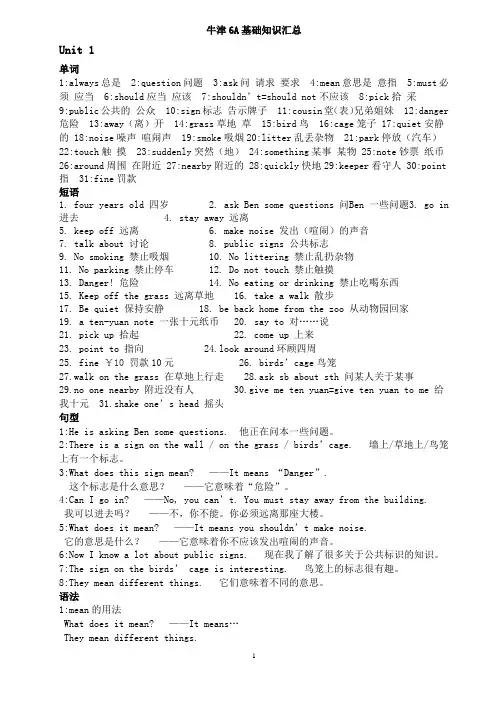
牛津6A基础知识汇总Unit 1单词1:always总是 2:question问题 3:ask问请求要求 4:mean意思是意指 5:must必须应当 6:should应当应该7:shouldn’t=should not不应该 8:pick拾采9:public公共的公众 10:sign标志告示牌子 11:cousin堂(表)兄弟姐妹 12:danger 危险 13:away(离)开 14:grass草地草 15:bird鸟 16:cage笼子 17:quiet安静的 18:noise噪声喧闹声 19:smoke吸烟20:litter乱丢杂物 21:park停放(汽车)22:touch触摸 23:suddenly突然(地) 24:something某事某物 25:note钞票纸币26:around周围在附近 27:nearby附近的 28:quickly快地29:keeper看守人 30:point 指 31:fine罚款短语1. four years old 四岁2. ask Ben some questions 问Ben 一些问题3. go in 进去4. stay away 远离5. keep off 远离6. make noise 发出(喧闹)的声音7. talk about 讨论 8. public signs 公共标志9. No smoking 禁止吸烟 10. No littering 禁止乱扔杂物11. No parking 禁止停车 12. Do not touch 禁止触摸13. Danger! 危险 14. No eating or drinking 禁止吃喝东西15. Keep off the grass 远离草地 16. take a walk 散步17. Be quiet 保持安静 18. be back home from the zoo 从动物园回家19. a ten-yuan note 一张十元纸币 20. say to 对……说21. pick up 拾起 22. come up 上来23. point to 指向 24.look around环顾四周25. fine ¥10 罚款10元 26. birds’cage鸟笼27.walk on the grass 在草地上行走 28.ask sb about sth 问某人关于某事29.no one nearby 附近没有人 30.give me ten yuan=give ten yuan to me 给我十元 31.shake one’s head 摇头句型1:He is asking Ben some questions. 他正在问本一些问题。
牛津英语6A模块单元知识点总结
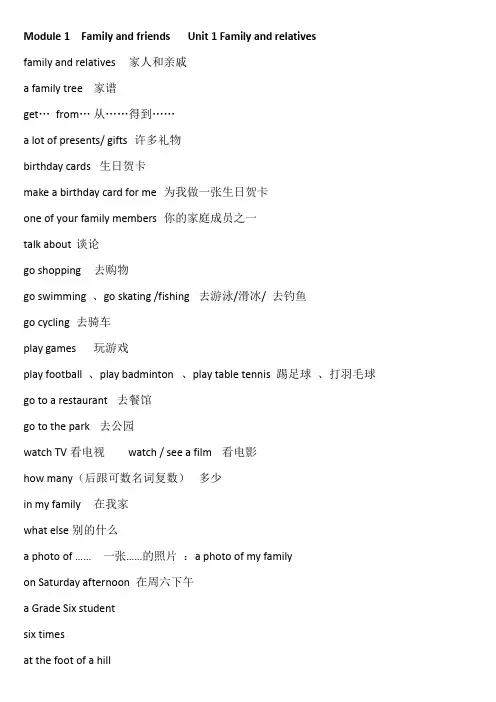
Module 1 Family and friends Unit 1 Family and relativesfamily and relatives 家人和亲戚a family tree 家谱get…from…从……得到……a lot of presents/ gifts 许多礼物birthday cards 生日贺卡make a birthday card for me 为我做一张生日贺卡one of your family members 你的家庭成员之一talk about 谈论go shopping 去购物go swimming 、go skating /fishing 去游泳/滑冰/ 去钓鱼go cycling 去骑车play games 玩游戏play football 、play badminton 、play table tennis 踢足球、打羽毛球go to a restaurant 去餐馆go to the park 去公园watch TV看电视watch / see a film 看电影how many(后跟可数名词复数)多少in my family 在我家what else别的什么a photo of ……一张……的照片:a photo of my familyon Saturday afternoon 在周六下午a Grade Six studentsix timesat the foot of a hillthis --- these ; that --- those;parents , daughter, son, uncle, aunt频率副词:always 、usually、often、sometimes、never 在be动词后,助动词后,情态动词后,实义动词Also “也”,用于句中;too“也”,用于句末;A lot of = lots of “许多,大量”,修饰可数名词复数、不可数名词Eg. a lot of / lots of water ; a lot of / lots of apples;。
苏教版牛津小学英语6A重点知识复习.ppt
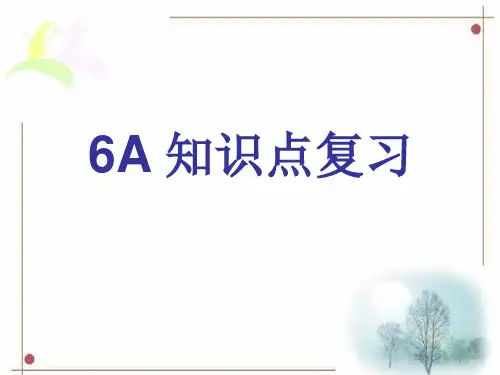
7. 当我们谈论某件物品现在在哪时,可以说: Where is…? It is…
当我们谈论某件物品刚才在哪时,可以说: Where was…? It was…
8. 当我们谈论某些物品现在在哪时,可以说: Where are…? They are… 当我们谈论某些物品刚才在哪时,可以说: Where were…? They were…
易错点: excited
兴奋的;激动的
形容人
All the students are very excited .
exciting 令人兴奋的;令人激动的
形容事或物
The running race is very exciting .
易错点:
a roll of film two rolls of film some films
• 2、Our destiny offers not only the cup of despair, but the chalice of opportunity. (Richard Nixon, American President )命运给予我们的不是失望之酒,而是机会之杯。二〇二〇年八月五日2020年8月5 日星期三
易错点:
We should keep off the grass. We shouldn’t walk on the grass.
易错点:
We should keep quiet. We shouldn’t make noise.
序数词的记法:
基变序,有规律,词尾加上th. 一二三,特殊记,词尾字母tdd. 八减t, 九减e, ve要用f替. 见y要变i和e,加上th莫忘记. 若要遇到几十几,只变个位就可以. 另外一定要在序数词前加个the.
牛津英语6a知识点梳理
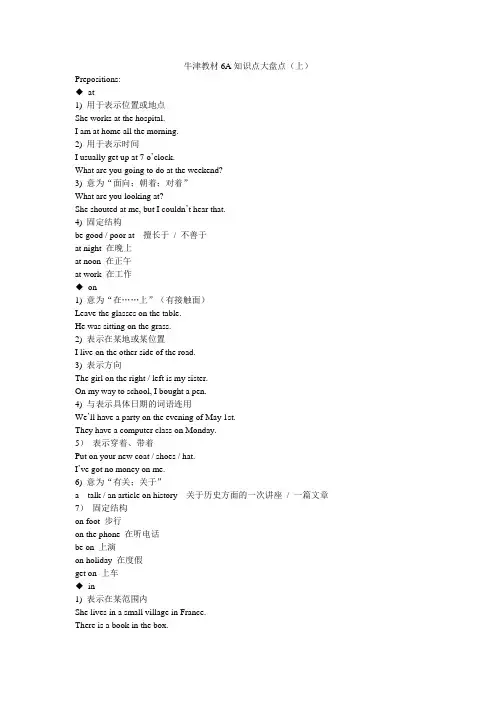
牛津教材6A知识点大盘点(上)Prepositions:◆at1) 用于表示位置或地点She works at the hospital.I am at home all the morning.2) 用于表示时间I usually get up at 7 o’clock.What are you going to do at the weekend?3) 意为“面向;朝着;对着”What are you looking at?She shouted at me, but I couldn’t hear that.4) 固定结构be good / poor at 擅长于/ 不善于at night 在晚上at noon 在正午at work 在工作◆on1) 意为“在……上”(有接触面)Leave the glasses on the table.He was sitting on the grass.2) 表示在某地或某位置I live on the other side of the road.3) 表示方向The girl on the right / left is my sister.On my way to school, I bought a pen.4) 与表示具体日期的词语连用We’ll have a party on the evening of May 1st.They have a computer class on Monday.5)表示穿着、带着Put on your new coat / shoes / hat.I’ve got no money on me.6) 意为“有关;关于”a talk / an article on history 关于历史方面的一次讲座/ 一篇文章7)固定结构on foot 步行on the phone 在听电话be on 上演on holiday 在度假get on 上车◆in1) 表示在某范围内She lives in a small village in France.There is a book in the box.2) 表示在某段时间内It happened in the past.My birthday is in August.3) 表示在某段时间后She will visit there in three weeks.I’ll come back in ten minutes.4) 固定结构be in = be at home 在家in spring / summer / autumn / winter 在春天/ 夏天/ 秋天/ 冬天in time 及时in hospital (生病)住院◆above 在……上方(没有接触面)The people in the flat above mine made a lot of noise.◆below 在……下方(没有接触面)Please do not write below this line.The temperature fell below freezing during the night.Adverbs:◆副词的分类1) 频度副词: always, often, usually, sometimes, seldom, hardly, never2) 地点副词: here, there, everywhere, anywhere, inside, outside3) 程度副词: much, little, very, rather, so, too, still, quite, enough, almost, slightly4) 疑问副词: how, when, where, why5) 表示先后顺序的副词:first / next / then / after that / finally; firstly / secondly / next / then / after that / finally◆副词的位置1) 多数副词都可以放在动词的后面;但如果动词带有宾语,副词就需放在宾语后面。
牛津版小学英语6A知识点归纳总复习
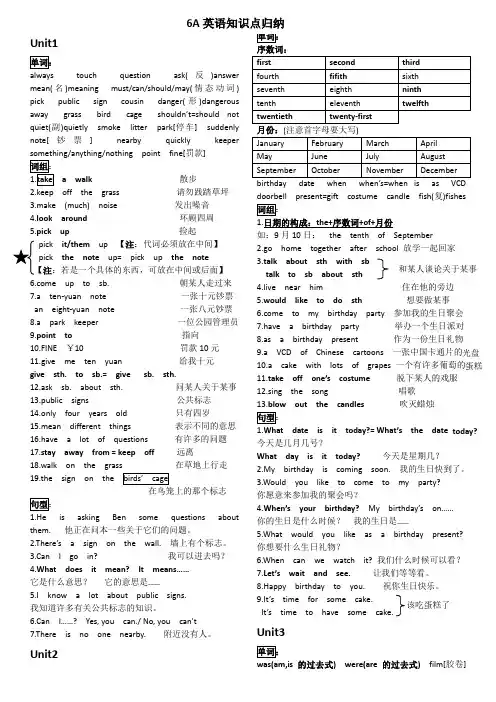
Unit1always touch question ask(反)answer mean(名)meaning must/can/should/may(情态动词) pick public sign cousin danger(形)dangerous away grass bird cage shouldn ’t=should not quiet(副)quietly smoke litter park[停车] suddenly note[钞票] nearby quickly keeper point fine[罚款]a walk 散步2.keep off the grass 请勿践踏草坪3.make (much) noise 发出噪音4.look around 环顾四周5.pick up 捡起pick it/them up 【注:代词必须放在中间】 pick the note up= pick up the note 注:若是一个具体的东西,可放在中间或后面】 e up to sb. 朝某人走过来 7.a ten-yuan note 一张十元钞票 an eight-yuan note 一张八元钞票 8.a park keeper 一位公园管理员 9.point to 指向10.FINE ¥10 罚款10元 11.give me ten yuan 给我十元 give sth. to sb.= give sb. sth.12.ask sb. about sth. 问某人关于某事 13.public signs 公共标志 14.only four years old 只有四岁15.mean different things 表示不同的意思 16.have a lot of questions 有许多的问题 17.stay away from = keep off 远离18.walk on the 在草地上行走 19.the sign on the在鸟笼上的那个标志1.He is asking Ben some questions about them. 他正在问本一些关于它们的问题。
牛津小学英语6A词组和重点语法知识

1、他的表弟_______________2、只有四岁_______________3、问问题________________4、公共标志______________5、远离__________________6、走在草地上____________7、鸟笼__________________ 8、吵闹__________________9、禁止吸烟______________ 10、禁止扔垃圾___________11、禁止停车_____________ 12、禁止触摸_____________13、禁止吃喝_____________ 14、禁止践踏草坪_________15、保持安静_____________ 16、散步_________________17、十元纸币_____________ 18、环顾四周_____________19、捡起_________________ 20、上来___________21、指向_________________ 22、罚十元_______________Unit 21、住在……附近_________2、谈论_________________3、一个生日聚会___________4、作为一个生日礼物____________5、一个日本动画光碟________________________________6、看阿拉丁_______________7、让我们等着看吧______________8、脱下___________________9、他的戏服____________________10、祝你生日快乐_________________________________11、吹灭蜡烛______________Unit 31、体育运动日_____________2、所有的学生__________________3、非常兴奋_______________4、看跑步比赛__________________5、拍照___________________6、找寻________________________7、非常令人激动____________8、一会儿之前__________________9、刚刚____________________ 10、在地上_____________________ 11、为我捡起它们____________ 12、一个___________________ 13、一副眼镜________________ 14、一个光盘随身听_____________ 15、一卷胶卷________________1、国庆假日________________2、上个星期___________________3、在节后__________________4、课前_______________________5、看电影__________________6、和我父母一起_______________7、一个有趣的动画__________8、参观一个农场_______________9、跟我的家人一起___________ 10、果树______________________ 11、烧饭_____________________ 12、捡鸡蛋____________________ 13、给奶牛挤奶_______________ 14、摘桔子____________________ 15、给花浇水_________________ 16、尝桔子____________________ 17、拔胡萝卜_________________ 18、在一个野营地______________ 19、打排球___________________ 20、在山脉中穿行______________ 21、非常累___________________ 23、去野营___________________Unit 61、变得非常兴奋______________2、在……之后到来_______________3、参加聚会__________________4、去年_________________________5、一顿丰富的午餐_____________6、拜访他们的亲朋好友____________7、美味的食物_________________8、当然__________________________9、我最喜欢的节日_____________ 10、在十月_______________________ 11、用戏服装扮________________ 12、吃月饼_______________________ 13、玩灯笼____________________ 14、看月亮_____________________ 15、度过时光__________________ 16、一个长假____________________ 17、去沙滩____________________ 18、吃粽子____________________Unit 71、在圣诞节__________________2、在圣诞节那天_________________3、祖父母的房子______________4、圣诞树_______________________5、一个漂亮的皮夹子___________6、喝茶_________________________7、不用谢;别客气_____________8、一些茶_______________________9、我得到了____________________ 10、来自我的爷爷________________ 11、在公交车的后部____________ 12、下车________________________ 13、在……前面________________ 14、走向司机____________________ 15、警察局____________________6A 复习材料〔Grammar)1.人称代词主格:I we you she he it they宾格:me us you her him it them 形容词性物主代词:my our your her his its their名词性物主代词:mine ours yours hers his its theirs2.可数词的复数形式1〕+ s a book ------books2〕- y+ ies a story------stories3〕+ es a glass------glasses a watch------watches4〕+s / +es a piano------pianos a mango-----mangoes5 - f / fe +ves a knife ------knives a shelf--------shelves3. 不可数名词(单复数形式不变) bread, rice, water ,juice , food etc.4. 缩略形式I’m = I amyou’re = you areshe’s = she ishe’s = he isit’s = it iswho’s =who iscan’t =can notisn’t=is notI'd = I wouldI've = I have etc.5. a/ana book a peach an egg an hour an oval an arangean apple6. 方位介词和时间介词方位介词:on, in ,in front of, between, next to, near, beside, at, behind, at the back of, under时间介词:at six o’clock, at Christmas, at breakfast on Monday on 15th July On National Day in the evening in December in winter7. 基数词和序数词one ------ first(1st)Two----second(2nd)three- third(3rd)twenty- twentieth(20th)*序数词必须加the8. Some /any( 肯定句用some,否认疑问句变any)I have some toys in my bedroom.Do you have any brothers or sisters?Would you like some juice? 除外9. be 动词(1) 基本形式: am/are/is (2) 肯定和否认句I am(not) from London. My eyes are(not) small. My hair is(not) long.3〕一般疑问句:Am I a Chniese? Yes, you are.No, you aren’t.Are they American? Yes, they are.No, they aren’t.Is the cat fat?Yes, it is.No, it isn’t。
牛津小学英语6A-知识要点汇总
牛津小学英语 6A 知识重点Unit 1单词:publicsignmeancousin堂(表)兄弟姐妹 question问题 公共的标记意思是bin 箱子 danger 危险 must 一定 away (离)开 grass 草 off 离开,(离)开 cage 笼子 quiet 寂静 noise 噪声 know 知道 conversation 对话 complete 完整的 smoke 抽烟 litter 乱丢 cycle 骑自行车 back 回suddenly 忽然地 note 钞票,纸币match 竞赛 around 在四周,四周 nearby 邻近的keeper 看守人point 指出fine 罚款rubbish 废物 ,词组:1. 严禁泊车 No parking2.严禁抽烟 No smoking3. 严禁吃喝 No eating or drinking4.严禁踩踏 keep off the grass 5. 严禁乱丢杂物 No littering6. 严禁触摸 Do not touch7. 寂静 Keep / Be quiet8.朝他走去 come up to him9.罚款 5元FINE ¥510.在鸟笼上 on the birds ’cage 11. 指向 point to12.只有四岁 only four years old13. 有很多问题 have a lot of questions14.问问题ask question15. 公共标记 public signs16. 严禁骑车 No cycling 17. 在危险中 in dange r 18.制造噪音 make noise 19. 漫步 take a walk20. 远离 stay away from21. 一个公园看守员a park keeper 22.环视 look around 23. 在草地上走 walk on the grass24. 进去 go in25. 建筑物上的标记 the sign on the building句型:1. 这个标牌是什么意思What does this sign mean它意指“危险”。
译林牛津英语6A学习知识重点汇总
6AUnit 1 The king’s new clothes[词汇学习]1.long long ago= many years ago很久以前,用在一般过去时态中,谓语动词用过去式.2.clever 聪明的反义词:foolish3.foolish adj.(形容词)愚蠢的 fool n(名词). 愚蠢4.through walk through走过 look through浏览ugh –laughs 短语:laugh at 嘲笑 laugh at sb.嘲笑某人反义词:cry laugh 是出声的笑,而smile 是微笑,常常是无声的笑7.wear-wears-wore 同音词:wherewear指的是穿着的状态,动作意味性不强,put on 强调穿的动作8.tell –tells –telling-toldtell是及物动词,后面常接双宾语,常用tell sb. sth.表示告诉某人某事 tell sb. about sth.”告诉某人关于某事”9.each 近义词:every 短语:each othereach修饰两个或两个以上的人或物,强调个体,而every修饰三个或三个以上的人或物,强调全体10.say-says-saying-said短语:say to sb.对某人说 say hello to sb.向某人问好11.sentence 短语: make sentences 造句I can make a sentence with “clever”12.quick 副词:quickly Liu Tao is quick ,you should run quickly.13.next 下一个反义词:last 上一个短语:next week下周 next time 下次 See you next time .14.little 小的,年幼的反义词:big 近义词:small15.think –thinks –thinking-thought 短语:think of想起 think hard 认真思考16.child复数:children 短语:Children’s Day儿童节 the only child 唯一的孩子17. turn to 变成 Water turned into ice at last.短语归纳Story timelong long ago 很久以前 new clothes 新衣服 one day 一天make…..for……为…….制作…… try on试穿 clever people聪明的人foolish people愚蠢的人 walk through走过 a lot of people 许多人in the street 在街道上 beautiful clothes漂亮的衣服 a little boy 一个小男孩 point at指着…….. Cartoon timeplay a game 玩游戏 tell a story 讲故事 each student 每个学生on the mountain 在山上 the next sentence 下一句 an old man 一位老人live in 居住在 think hard 认真思考 have to 不得不Grammar time一般过去式的用法1. 一般过去式的概念:表示在过去某个时间发生的动作或状态,常与表示过去的时间状语连用。
牛津6A知识点复习
牛津6A知识点复习在小学英语的学习中,牛津 6A 是一个重要的阶段。
为了帮助同学们更好地掌握这部分知识,咱们一起来进行一次全面的复习。
一、词汇首先是词汇部分,这可是英语学习的基础。
1、关于人物我们学习了“doctor(医生)”“nurse(护士)”“teacher(教师)”“student(学生)”等职业类词汇。
还有“father(父亲)”“mother(母亲)”“brother(兄弟)”“sister (姐妹)”等家庭成员的称呼。
2、地点“school(学校)”“hospital(医院)”“park(公园)”“supermarket (超市)”等是我们经常会用到的地点词汇。
3、动作像“run(跑)”“jump(跳)”“swim(游泳)”“fly(飞)”等表示动作的词。
4、形容词“big(大的)”“small(小的)”“tall(高的)”“short(矮的)”“fat (胖的)”“thin(瘦的)”等形容词可以用来描述事物的特征。
要记住这些词汇,不能死记硬背,可以通过图片、句子或者实际场景来帮助记忆。
二、语法语法是英语学习中的重点和难点。
1、一般现在时这是我们经常会用到的时态,表示经常发生的动作或存在的状态。
比如:“I go to school every day(我每天去上学。
)” 主语是第三人称单数时,动词要发生变化,像“He likes playing football(他喜欢踢足球。
)”中的“like”就要变成“likes”。
2、现在进行时表示正在进行的动作,结构是“be +动词的现在分词”。
例如:“I am reading a book now(我现在正在读书。
)”3、一般过去时用来描述过去发生的事情,动词要用过去式。
像“I went to Beijing last year(我去年去了北京。
)”4、名词的单复数一般情况下,直接在名词后面加“s”,比如“book books”。
但有些名词的复数形式是不规则的,比如“man men”“woman women”“child children”。
牛津小学英语6A 复习要点1
牛津小学英语6A 复习要点:一、按要求改句子专项:1.He would like some cakes.(否定句、一般疑问句、划线部分提问、同义句)2.It means ‘No smoking’.(同义句、划线部分提问)3.She was in the park.(复数句、划线部分提问)4.She watered trees in the park yesterday.(否定句、一般疑问句、划线部分提问)5.It’s the 2nd of May. (划线部分提问)6.My birthday is on the 2nd of May. (划线部分提问)7.They are our flowers. (划线部分提问)8.The watch is from us. (划线部分提问)9.Can I watch TV? (肯定、否定回答)二、知识点整理:1.禁止吸烟(2种表达)2.必须起床应当吃午饭3.想要一些蛋糕(2种表达)想要吃一些蛋糕(2种表达)4.写出所知道的过去式的时间状语。
5.分别写出介词用on 或at 的节日。
6.注意一下序数词的表达 4、14、40、12、20、9、19、90、5、15、25、50写出日期:9月12日在8月5日在12月7.写出人称代词和物主代词并写出各自的用法。
注意人称代词的疑问词(who)、物主代词的疑问词(whose)6B复习要点一、按要求改句子专项:1.Nancy is taller than her.(否定句、一般疑问句、划线部分提问、同义句)2.Her shoes are bigger than mine.(否定句、一般疑问句、划线部分提问、同义句)3.She runs swims faster than David.(否定句、一般疑问句、划线部分提问、同义句)4.They got up earlier than us yesterday.(否定句、一般疑问句、划线部分提问、同义句)5.I take a bus No.5 .(划线部分提问)6.Ther are five stops(划线部分提问)7.The bus stop is over there.(划线部分提问)8.I like summer best.(否定句、一般疑问句、划线部分提问、同义句)9.I’m going to play football tomorrow.(否定句、一般疑问句、划线部分提问)10.I’m going to the park.(划线部分提问)11.It’s sunny. (划线部分提问)二、知识点整理:1.形容词和副词的比较级的组成2.as+形容词和副词原形+as 和…一样3.in the streeton the road\on the right(left)at the stop\at the crossing4.get on\get off5.和南京一样热比南京更热6.周末计划顺便问一下在音乐会上7.Can I have some …?三、复习要点:(括号内主要适合的题型)1.四会单词(单词默写、英汉互译)四会句型(根据汉语意思写句子)2.三会单词(英汉互译)三会句型(选择题)3.课文读背(听力、选择题、作文)4.每单元主要知识点的掌握5.听力题、语音题、作文易失分。
- 1、下载文档前请自行甄别文档内容的完整性,平台不提供额外的编辑、内容补充、找答案等附加服务。
- 2、"仅部分预览"的文档,不可在线预览部分如存在完整性等问题,可反馈申请退款(可完整预览的文档不适用该条件!)。
- 3、如文档侵犯您的权益,请联系客服反馈,我们会尽快为您处理(人工客服工作时间:9:00-18:30)。
牛津小学英语6A知识要点Unit 1单词:cousin堂(表)兄弟姐妹question问题public公共的 sign标志mean意思是bin箱子danger危险must必须 away(离)开grass草off脱离,(离)开cage笼子quiet安静noise噪声know知道conversation对话complete完全的smoke吸烟litter乱丢cycle骑自行车back回suddenly突然地note钞票,纸币match比赛around在周围,四面nearby附近的keeper看守人 point指出fine罚款rubbish废物,词组:1.禁止停车No parking2.禁止吸烟No smoking3.禁止吃喝No eating or drinking4.禁止践踏keep off the grass5.禁止乱丢杂物No littering6.禁止触摸Do not touch7.安静Keep /Be quiet 8.朝他走去come up to him9.罚款5元FINE ¥5 10.在鸟笼上on the birds’cage11.指向point to 12.只有四岁only four years old13.有许多问题have a lot of questions 14.问问题ask question15.公共标志public signs 16.禁止骑车No cycling17.在危险中in dange r 18.制造噪音make noise19.散步take a walk20.远离stay away from21.一个公园看守员a park keeper 22.环顾look around23.在草地上走walk on the grass 24.进去go in25.建筑物上的标志the sign on the building句型:1.这个标牌是什么意思?What does this sign mean?它意指“危险”。
It means “Danger”.2.那个标牌什么意思? What does that sign mean?它意指你不应该在草地上走。
It means you shouldn’t walk on the grass.3.它是什么意思?What does it mean?它意指你应该远离建筑物。
It means you should stay away from the building.4.我现在可以看电视了吗?Can I watch TV now?不,你不可以。
你应该先做你的家庭作业。
No, you can’t. You should do your homework first. 5.杰克只有四岁,但他总是有许多问题要问。
Jack is only four years old, but he always has a lot of questions.6.他正在问本一些有关公共标志的问题。
He is asking Ben some questions about public signs.7.我可以进去吗? Can I go in?不,你不可以。
你必须远离这座建筑物。
No, you can’t. You should stay away from the building.部分语言点解析1.动词如果在No后表示禁止做某事,动词要用ing形式,如:No swimming;如果前面是don’t 或者do not后面跟动词原形,如:Do not touch.2.must, would, should (shouldn’t), can,may的区别must 表示必须一定做到的事情;would表示想要做的事情,would like to do sth.should(shouldn’t)表示应该或不应该;can表示能够,会做某事;may表示可以或允许做某事。
must, should shouldn't, can, may都是情态动词,后面都跟动词原形。
Unit 2单词:Birthday生日 date日期 when何时 as作为present礼物VCD影视光碟Aladdin阿拉丁Let’s wait and see让我们等着瞧doorbell门铃candle蜡烛costume全套服饰blow out 吹灭second第二 third第三fourth第四fifth第五 sixth第六twelfth第十二twentieth第二十twenty-first第二十一 January一月 February二月March三月 April四月 May五月 June六月 July七月August八月September九月October十月November十一月 December十二月词组:1.本的生日Ben’s birthday2.一起回家go home together3.十月16号 the sixteenth of October4.拜访某人visit somebody( sb.)5.谈论某事talk about something (sth.)6.和某人谈话talk to/with somebody(sb.)7.日本卡通片Japanese cartoons8.作为一个生日礼物as a birthday present9.举行生日聚会have a birthday party 10.祝你生日快乐Happy birthday to you !11.等会儿看wait and see 12.脱掉你的鞋take off your shoes13.吹灭蜡烛blow out the candles 14.在本的生日聚会上at Ben’s birthday party 15.通过电话on the phone 16.一个大生日蛋糕a big birthday cake 17.做张生日贺卡make a birthday card 18.一张纸a piece of paper19.在海湾in the bay 20.中国的新年Chinese New Year21.在日历上on the calendar 22.马上到come soon23.一张纸 a piece of paper 24.写信息write a message25.一大早early in the morning句型:1)今天几号? What date is it today?今天是九月二十三号。
It’s the twentieth-third of September.2)你何时过生日? When’s your birthday?我的生日是十月十八号。
My birthday’s on the eighteenth of October.3)你想要什么东西作为生日礼物?What would you like as a birthday present? 我想要一个日本卡通片的光盘。
I’d like a VCD of Japanese cartoons.5)你们经常举行生日聚会吗? Do you often have a birthday party?6)本正和他的家人讨论关于他的生日聚会的事。
Ben is talking to his family about his birthday party.8)本吹灭了蜡烛上的蛋糕。
Ben blows out the candles on the cake.9)阿拉丁正脱掉他的戏服。
Aladdin is taking off his costume.部分语言点解析(1)I’d like=I would like我想要某物 === I want…I’d like to = I would like to 我想要做某事 == I want to …would like想要的意思。
可用于表示邀请,后面如果加动词用would like to+动词原形例1.I’d like some balloons. →Would you like some balloons?=I want some balloons . → Do you want some balloons ?2. I’d like to watch TV . → Would you like to watch TV?=I want to watch TV . → Do you want to watch TV?(2)介词in. on at的用法in表示:“段”时间,常用在年份,月份,季节前,也用在上午,下午和晚上前。
例如:in 1997在1997年in spring在春季in May在五月in the moring在上午in the afternoon在下午in the evening在晚上on表示具体的某一天,常用在星期,具体的一天前。
例如:on Monday 在星期一on the first of March在三月一日at用在时刻前例如:at ten o'clock在十点钟Unit 3单词:was (am,is的过去式) excited激动的,兴奋的monent片刻,瞬间ago以前were(are的过去式)glasses眼镜camera照相机CD Walkman光盘随声听roll卷,卷状物film胶卷ground地面exciting令人激动的,令人兴奋的earphone耳diary日记,日记簿remember记住,记得weren’t = were notmobile phone手机,手提电话race比赛词组:1.Sports Day体育运动日2. all the students所有的学生3.watch a running race观看赛跑4.very excited非常的兴奋5.look for 寻找6. very exciting非常的令人兴奋7.a moment ago一会儿前 8.let me see让我看看9.just now刚才 10.on the ground在地上11.pick them up把它们捡起来 12. can’t find找不到13.want to know想知道 14.behind the door在门后面15.a pair of glasses一副眼镜 16.a roll of film 一卷胶卷17.beside the copybooks on your desk在你桌子上的抄写本旁18.try to remember试着记住句型:1.Where’s my diary? It’s on the desk. It isn’t there now. It was there a moment ago.我的日记在哪里?它在课桌上。
